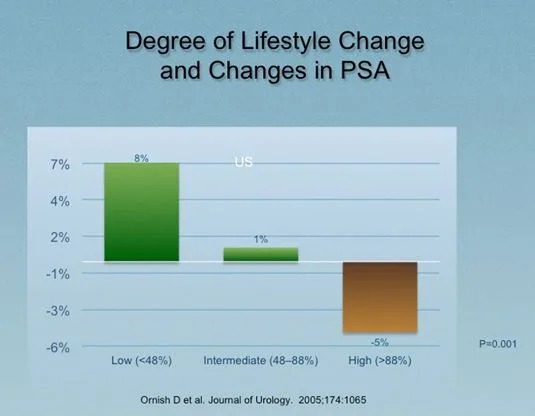Part 4: Lifestyle and health: The saga of a research couple living in Cuenca
Author’s note: This is the fourth and final article for the CuencaHighlife series that shares the scientific discoveries of how changes in lifestyle can reverse coronary heart disease and prostate cancer without drugs or surgery. In this article the author provides evidence that this lifestyle approach can be an effective treatment for prostate cancer. The closing segment describes an international congress that the author and his spouse, Deborah Kesten, organized with topics and speakers from the USA and other countries. Working with the local nonprofit, Casa de la Diabetes, this three-day conference on lifestyle and health will cover every aspect of this miraculous program. The congress will be held in Cuenca at the Mall de Rio Conference center on November 11-13, 2015. For more information about the conference and to sign up, click here.
- Part 1: Lifestyle and health: The saga of a research couple living in Cuenca
- Part 2: The research saga of an expat couple living in Cuenca
- Part 3: Lifestyle and health: The saga of a research couple living in Cuenca
- Part 4: Lifestyle and health: The saga of a research couple living in Cuenca
By Larry Scherwitz, PhD
Following the San Francisco Lifestyle Heart Trial my colleagues and I continued researching the benefits of a comprehensive program of diet, exercise, stress management, and social support for coronary heart disease, now the world’s major killer. Our focus was primarily on how well the program could be adapted to other countries and with other cardiac rehabilitation teams. Following the presentation of our reversal of heart disease results in 1990, I was invited to continue this research in Germany as a guest professor in the classic German city of Marburg am Lahn.
After two years in Germany we demonstrated that German and Dutch heart patients could achieve or exceed the degree of lifestyle changes and reductions in risk factors that we found in the United States. German Heart Patients: click here.

This Marburg, Germany castle was built in the 12th Century and the Cathedral was constructed on the burial site of a wealthy aristocrat who gave her wealth to form alm houses for the poor. The site of her burial was where miracles occurred and the city became a pilgrimage destination in the middle ages.
After two years in Germany, Deborah and I returned to Sausalito, California where I worked again with Dean Ornish. A this time, questions arose about our ability to get heart patients to make the lifestyle changes necessary to produce our results. Doubts were expressed about other teams’ ability to get this degree of change. Accordingly, we initiated a study of 440 heart patients in eight sites across the United States. We found that the teams in each of these hospitals were able to get their patients to adopt these changes, but not quite as intensely with respect to yoga and meditation as we found in Houston and San Francisco. This study and an even larger one to follow showed that comprehensive lifestyle changes dramatically reduced risk factors, and subsequently could reduce medical care expenses due to a reduction in cardiac events such as bypass surgery and heart attacks. In addition, as our other studies showed the psychosocial well being of patients improved, including reduction in depression, anxiety, and hostility, as well as increases in well being. For more information, click here.
While in Sausalito I again assumed the role of international ambassador by accepting an invitation from a group of cardiologists at the top medical center in India, the All India Institute of Medical Science in New Delhi (AIIMS).
These cardiologists had read about our research and wanted to make our work the opening keynote address at the conference entitled, First International Conference on Lifestyle and Health held in 1995. Prominent among the cardiologists was Bimal Chhajer, who would become, in some key respects, the Dean Ornish of India.
The results of the keynote presentation inspired the cardiology group to initiate a consultation with me that would result in their conducting a clinical trial to see if Indian Heart patients who make the same four-component lifestyle changes can reverse the blockages in their coronary artery arteries. This group succeeded in finding angiographic evidence of a reversal of blockage in those who made lifestyle changes. These results prompted Dr. Bimal to resign from AIIMS and form his own organization called the Science of Art and Living. Through SAAOL, Bimal has become a tireless proponent of the yoga lifestyle; he has written 100 books, including Yoga for Reversal of Heart Disease and the popular Zero Oil Cooking. Through his efforts there are clinics for non-invasive treatment of heart disease in 30 cities in India and over 50,000 patients with proven heart disease have shown they can adapt this program.
Prostate Cancer Research
Satisfied that heart disease could be reversed with lifestyle changes, Dean initiated what is perhaps his greatest challenge yet, to see if this four-component lifestyle could halt or reverse cancer. It’s very difficult to find patients with cancer who don’t get it treated immediately. In fact, there is only one type of cancer that is not treated immediately—prostate cancer, which is slow growing and its treatment, such as surgery and radiation, has very significant negative side effects. It After many months, Dean and his team found 181 patients who were eligible for the study. Of those, 93 volunteered for the study and were either assigned to a lifestyle change or conventional care group.

Changes in PSA in the 2 Groups: The Prostate Specific Antigen (PSA) reflects cancer growth, suggesting that in the control group (top line in the graph) prostate cancer grew, but in the lifestyle change group cancer decreased.
Given that reversing cancer was probably an even bigger challenge than slowing heart , Dean prescribed a totally vegan diet without any animal products.
He also found research studies showing that the intake of total and specific vegetables, tomato products (lycopene), vitamin E, selenium, vitamin C and soy products has been inversely related to cancer risk, so these were added to the dietary recommendations. Given the fact that these patients were dedicated to avoiding the adverse side effects of surgery, drugs, and radiation, the expert team succeeded in getting these them to successfully follow the program. The results, after one year, showed that those making comprehensive lifestyle patients lost weight and reduced their cholesterol levels as we found before, but more impressively, they had a reduction in prostate specific antigen (PSA) the key measure of prostate tumor growth. For more information, click here.
None of the patients who followed the lifestyle change approach went on to have surgery or other forms of treatment, but six patients in the control group had such rises in their PSA levels or tumor size that they were aggressively treated with surgery or androgen therapy. Also encouraging was the evidence showing a shrinking the tumor size in patients who followed the lifestyle program vigorously. Again, those who spent more time doing yoga had a greater reduction of PSA levels than those who made fewer lifestyle changes figure.

Prostate Tumor Size Before and After Lifestyle Changes: Tumor size is reflected by the red area on the left; the right image was taken after lifestyle changes and reflects a smaller tumor.
In a later study with 30 prostate cancer patients, Dean and his team found that when the serum was taken from prostate cancer patients three months after initiating lifestyle changes, it inhibited the growth of prostate cancer cells eight times more readily than before these patients began making lifestyle changes.
To get to the bottom of how lifestyle could change the course of cancer, Dean conducted a pilot study of normal tissue taken during biopsy of a sub-sample of prostate cancer patients; he found that the lifestyle program successfully regulated the genetic activity of genes that were making proteins that the cancer growth used to grow. For more information, click here.
Finally, Dean and his team initiated a pilot study of the telomeres, those wick-like endings of chromosomes that shorten as we age; when they get too short, they can cause chronic disease. Those who initiated the program of lifestyle change had a lengthening of telomeres, raising the possibility that lifestyle changes can reverse the aging process. For more information, click here.

Degree of Lifestyle Change and PSA Levels: Combining both groups and dividing into three groups on the basis of the lifestyle changes they made shows that those with the least lifestyle change had the greatest increase in PSA, whereas those with the most lifestyle change had drops in PSA.
With these impressive findings and Dean’s persistent lobbying in Congress, even of President Clinton, he was able to convince Medicare to pay for the program for patients diagnosed with heart disease and prostate cancer. Presently, Dean is collaborating with an international company Healthways to train cardiac teams throughout the U.S.
Cuenca Congress on Lifestyle and Health
Deborah Kesten, and I are working with Drs. Ana Fernanda Sánchez, founder of Casa de la Diabetes, and her brilliant bilingual daughter, Danielle Molina to host the first Latin American conference on lifestyle and health in Cuenca at the Mall del Rio, November 11-13. Our job is to provide topics and to recruit speakers. In addition, Mayor Marcelo Cabrera of Cuenca is working with Fernanda Sánchez to arrange interviews with us for radio, television, and the local newspapers. The official conference title is Primero Congreso Internacional Hábitos de Vida Saludable. In English, the title is The First Latin American Congress on Lifestyle and Health. Expats are welcome to attend; most of the presentations are in English, and where they are conducted in Spanish, an English translation will be provided. The cost is $60 for the three-day program. There will be 17 lectures on diet, exercise, hatha yoga, and social support from international experts in their field. To register for the program go to http://casadeladiabetes.org.

Degree of Lifestyle Change and Inhibition of Tumor Growth: When prostate cancer cells were introduced into serum taken from research participants those who made the most lifestyle change had the greatest inhibition of cancer cell growth
The basis of this conference is first to present the benefits of combining the four-components and other lifestyle approaches by drawing upon rigorous research presented in this series. Then, there will be presentations on the healthiest approaches to food, the importance of reducing stress and how to manage it, the newest findings on how to exercise, and how much exercise we need, and an often overlooked aspect in medicine: how giving and receiving loving support can prolong life and improve well-being. Each component will not only report on how we benefit from adopting each component, but how we can incorporate these into our daily lives.
This is the first time a conference has been organized around the four-component lifestyle approach described in this and the preceding three articles in CuencaHighlife. But there will also be something new not presented before internationally. For example, Deborah Kesten will unveil the research she did on wisdom traditions, cultural traditions, and healing traditions to develop six perennial themes of how best to regard, prepare, eat, and share food. Based upon the discovery of these themes, she will then present the research we conducted with 5,256 individuals to identify how not following these themes leads to over eating, overweight, and obesity. In addition, the conference will feature a naturopathic research physician and international expert, Ryan Bradley, who is a widely acknowledge top expert on Type 2 diabetes, Ecuador’s fastest growing chronic disease. And finally, CuencaHighlife nutrition columnist Susan Burke March will present results on the lifestyle in those regions of the world where people live the longest.





















